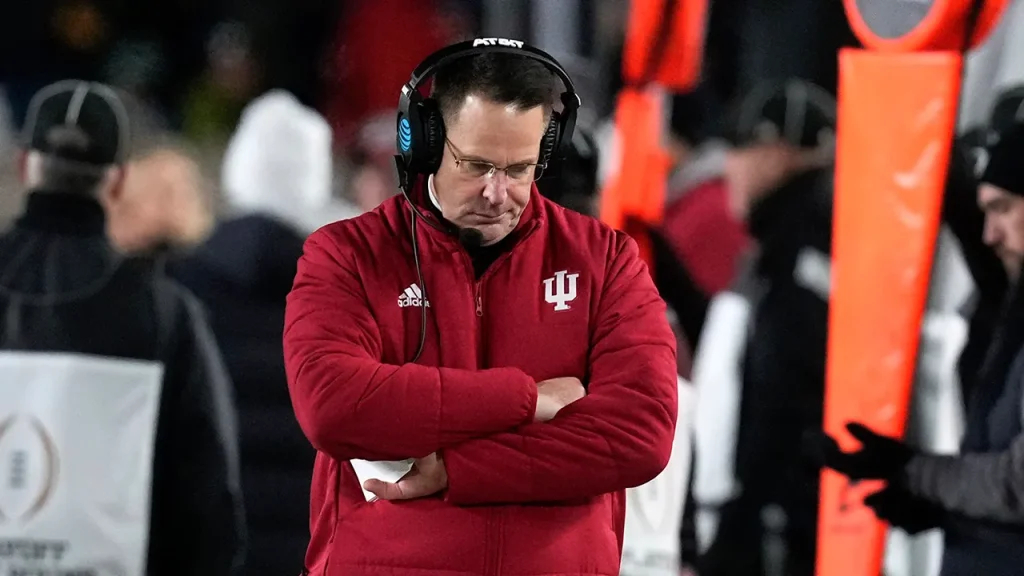The Indiana Hoosiers, led by head coach Curt Cignetti, entered the College Football Playoff with a swagger rarely seen from a team facing a powerhouse like Notre Dame. Cignetti’s pre-game bravado, boasting that the Hoosiers didn’t just beat top-25 teams but “beat the s— out of them,” set the stage for a high-stakes showdown. However, the game unfolded in a manner that starkly contrasted Cignetti’s pre-game confidence. The Fighting Irish controlled the narrative, ultimately delivering a 27-17 defeat to the Hoosiers, leaving Cignetti to grapple with the consequences of his bold pronouncements and a controversial fourth-quarter decision that sealed his team’s fate.
The game’s pivotal moment arrived late in the fourth quarter, with Indiana trailing by 17 points and facing a fourth-and-11 situation at the Notre Dame 48-yard line. With the game hanging in the balance, conventional wisdom dictated an aggressive approach. A first down would not only keep the drive alive but also inject a much-needed dose of momentum into a struggling Indiana offense. Instead, Cignetti opted for a conservative punt, a decision that confounded analysts and fans alike, and ultimately proved detrimental to his team’s comeback hopes.
Cignetti’s post-game explanation offered a glimpse into his rationale. He cited the stagnant performance of his offense, juxtaposed with the resilience of his defense, as the primary factors influencing his decision. He acknowledged his reluctance to punt, emphasizing that he felt it was the “best move” given the circumstances. He argued that a fourth-and-10 conversion was a low-probability outcome, based on the offense’s struggles throughout the game, and that punting offered a chance to pin Notre Dame deep and give his defense an opportunity to force a turnover and create a scoring opportunity. His reasoning, however, was overshadowed by the eventual outcome. Notre Dame capitalized on the favorable field position following the punt, extending their lead and effectively extinguishing any lingering hopes of an Indiana comeback.
The decision to punt encapsulated the larger narrative of the game: a mismatch between pre-game expectations and on-field reality. Cignetti’s pre-game bluster, while intended to motivate his team and project confidence, ultimately backfired. The Hoosiers, unable to translate their coach’s words into action, were outplayed by a more disciplined and efficient Notre Dame squad. The loss served as a harsh reminder of the importance of backing up bold pronouncements with on-field performance. The disparity between Cignetti’s pre-game confidence and his team’s subsequent performance underscored the critical difference between rhetoric and results in the high-stakes world of college football.
The contrasting fortunes of the two teams following the game further highlighted the significance of the outcome. Notre Dame, buoyed by their victory, advanced to the Sugar Bowl to face the SEC champion Georgia Bulldogs. For Indiana, the loss marked the end of their season, leaving them to reflect on a missed opportunity and the lingering questions surrounding Cignetti’s strategic choices. The loss to Notre Dame cast a shadow over what had otherwise been a successful season for the Hoosiers. It served as a stark reminder that in the competitive landscape of college football, confidence must be earned through performance, not merely proclaimed through pre-game pronouncements.
The game between Indiana and Notre Dame served as a microcosm of the unpredictable nature of college football. While pre-game narratives and bold predictions often add to the excitement and drama, the ultimate arbiter remains the on-field performance. Cignetti’s pre-game trash talk, while perhaps intended to galvanize his team, ultimately became a footnote in a game that highlighted the importance of humility, strategic decision-making, and the ability to execute under pressure. The loss served as a valuable lesson for Cignetti and his Hoosiers, reinforcing the age-old adage that actions speak louder than words, especially in the high-stakes arena of college football playoffs. The game’s outcome also underscored the importance of adapting to changing circumstances and making strategic adjustments based on the flow of the game, rather than clinging to pre-conceived notions or pre-game pronouncements.

